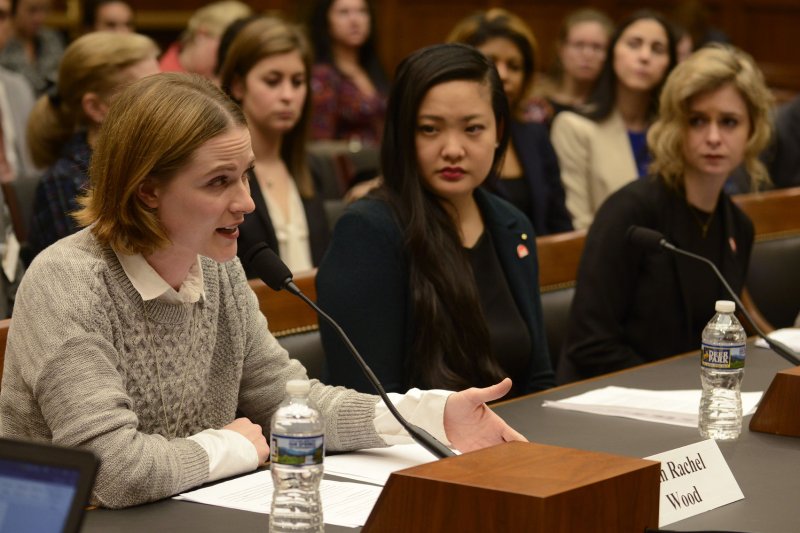1 of 4 | Actress, rape survivor and advocate Evan Rachel Wood (L) makes remarks as RISE Chief of Staff Lauren Libby (R) and RISE founder and CEO Amanda Nguyen (C) listen during a hearing of the House Subcommittee on Crime, Terrorism, Homeland Security and Investigations hearing on Tuesday. Photo by Mike Theiler/UPI |
License Photo
Feb. 27 (UPI) -- Actor Evan Rachel Wood was among a panel of activists who testified before Congress on Tuesday in support of the federal bill of rights for sexual assault survivors.
The Westworld and Thirteen actor spoke about her multiple experiences of sexual assault during a hearing of the House Judiciary Subcommittee on Crime, Terrorism, Homeland Security and Investigations.
"I struggle to speak to you today because I'm not sure what words are appropriate when discussing this issue," she told the committee.
"It started slow but escalated over time, including threats against my life, severe gas-lighting and brainwashing, [and] waking up to the man that claimed to love me raping what he believed to be my unconscious body," Wood said. "And the worst part: Sick rituals of binding me up by my hands and feet to be mentally and physically tortured until my abuser felt I had proven my love for them."
Wood said the abuse resulted in depression, addiction, agoraphobia, night terrors and post-traumatic stress disorder, which wasn't diagnosed until years later. She said the Sexual Assault Survivors' Bill of Rights Act passed in 2016 is important in "the recognition of basic civil rights for sexual assault survivors and serves as a first step."
"It's a safety net that may help save someone's life one day."
The law gives sexual assault survivors the right to a sexual assault evidence collection kit, requires that they be notified in writing if a kit is set to be destroyed and allows them to request that it be preserved.
The law, though, is a federal one and not all states have passed similar legislation, House judiciary committee Chairman Bob Goodlatte, R-Va., said in remarks before Wood's testimony.
"These rights are now available to victims of federal crimes but, unfortunately, are not consistently recognized by every state -- and of course, it is in the states where most sexual assault cases are prosecuted," he said.
Amanda Nguyen, CEO and founder of RISE, an anti-sexual assault advocacy group, said that since the federal legislation became law, nine states have enacted similar laws. She helped write the federal bill. Lauren Libby, chief of staff of RISE, also testified.
"The federal bill is a model for states to follow. Nine states have but we still have 41 states to go," Nguyen said. "I know firsthand the failings of America's justice system, but I also know the change that ordinary Americans can bring."
Also Tuesday, Sen. Elizabeth Warren, D-Mass., and Rep. Jacky Rosen, D-Nev., announced companion bills to require publicly traded companies to report sexual abuse, harassment or other discrimination settlements.
"We are in a moment in American history where people are coming together to say enough," Warren said. "But there won't be real change until harassment in all corners of the country is exposed and the harassers are held accountable."















